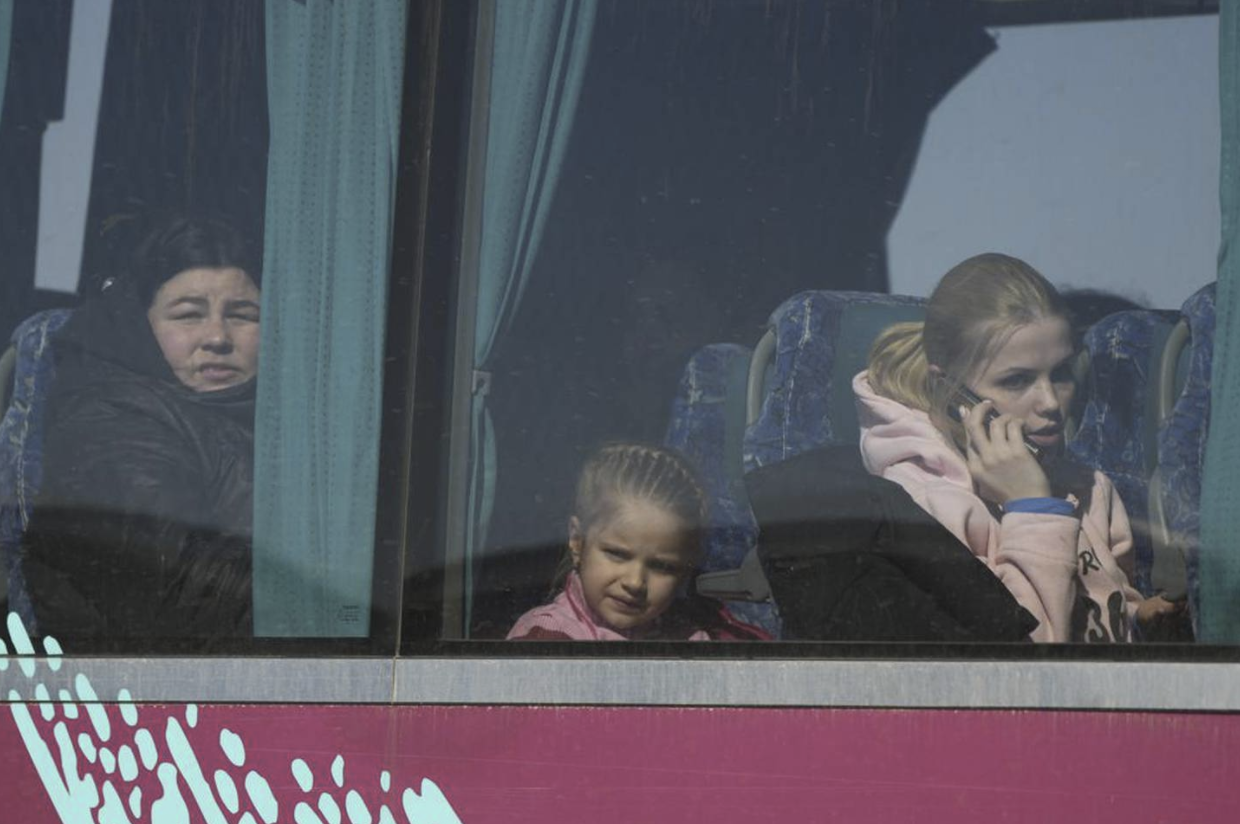Moldova Struggles with Influx of Ukrainian Refugees
Ukrainian children coloring at a refugee camp at MoldExpo national exhibition center in the Moldovan capital Chisinau, Moldova on March 14, 2022. Photo: Associated Press/ Sergei Grits
About a month into the war between Russia and Ukraine, hundreds of thousands of migrants have entered Moldova, a small, poor, landlocked nation to the west of Ukraine. The tiny nation of only 2.6 million people has pleaded for assistance from the European Union and United Nation agencies for aid as the refugee crisis overwhelms the nation's healthcare system and underfunded and underdeveloped school system.
In a press conference with the World Health Organization (WHO), Moldovan Minister of Health Ala Neremenco stated that approximately 331,000 refugees have entered Moldova and around 100,000 have remained. Neremenco added that it is clear that “the resources of the country are limited and we wouldn't want this to affect or become a burden for the citizens of the Republic of Moldova,” and “that is why we have addressed all our partners to ask for support in this situation.” She added that these events have never taken place in Moldova before, so this is a serious issue that is putting the Moldovan healthcare system under a lot of strain. Although the EU has attempted to answer the Moldovan government's cries for help, Neremenco stated many Ukrainians have preferred to stay in Moldova due to the proximity and linguistic similarity to Ukraine.
According to data released by UNICEF, children account for about half of the total 3 million Ukrainians who have fled the war, and nearly 337,000 children have entered Moldova, a different total than what Neremenco stated. Moldova has had to set up makeshift shelters quickly for the refugees as well as provide mental health care for mothers and their children who have witnessed the horrors of war, while their fathers stay behind to defend their nation. The mismanaged and underdeveloped public schools of Moldova are expected to continue being under extreme pressure as 55 Ukrainian children flee every minute from Ukraine.
Moldovan Foreign Minister Nicu Popescu has also voiced his concerns about the Ukrainian refugee crisis, but also the economic and political effects of the Russian invasion of Ukraine as a whole. Popescu told the Financial Times that Moldova is “the single most fragile neighbor of Ukraine . . . [Moldova] need[s] help to stay on [its] feet.” He continued, saying the war is an issue for Moldova and that economic and political stability for Moldova is important to everyone.
Moldova, like Ukraine, is a former Soviet Republic that has yet to join NATO. The two nations are also strengthening democratic norms and conventions within their developing democracies. In Moldova, there is a strip of land called Transnistria that Russia claims is sovereign, similar to Donbass and Luhansk in Ukraine. Currently Russian troops are stationed there for “peacekeeping” despite calls for their removal from Moldovan President Maia Sandu. Ukraine and Moldova both fear the potential for the territory to be used to create a new war front for Ukraine and further destabilize the region.
Refugees from the war in Ukraine looking out from a bus at the border between Ukraine and Moldova in Palanca, Moldova on March 19, 2022. Photo: Associated Press/ Sergei Grits
Fortunately, the Moldovan government's appeal for aid from the European Union and the United Nations have not fallen upon deaf ears. On March 17, the European Union and Moldova signed an agreement ensuring border cooperation between Frontex, the geopolitical bloc's border agency, and Moldova. In the agreement, the EU lauded Moldovan efforts to accept refugees as impressive, as well as guaranteeing that the “EU will provide further assistance to support border management with the actual deployment of Frontex border guards in the territory of Moldova, to work hand in hand with Moldovan border guards in the performance of their work.”
On March 22, the UN Refugee Agency (UNHCR) and the International Organization of Migration (IOM) released a joint statement congratulating the pledge the EU made to help displaced migrants leave Moldova for EU member states through its EU Solidarity Platform. In addition the two groups have begun identifying vulnerable individuals and helping the EU and Moldova fly them out to other EU member states, as well as preparing them for what life will be like in these nations.
On the same day, Switzerland announced that they would give Moldova 2 million dollars to help the nation deal with the influx of refugees. In addition some staff from the famously neutral nation's embassy relocated from their embassy in Ukraine in Kyiv to Moldova.
With no end in sight for the war between Russia and Ukraine, and a seemingly endless flow of refugees from Ukraine to Moldova, time can only tell how long Moldova can handle the stress of accepting refugees. Uncertainty for the future is spreading among everyone in Moldova and the whole continent. Foreign Minister Nicu Popescu shares this sentiment. “Everyone’s previously existing military, security, diplomatic, political and societal landscapes have now changed,” Popescu said. “There is no way back to normal for the whole continent.”


